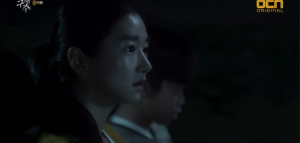 In its first four episodes, Save Me sets up a sensibly bleak scaffolding with human cynicism and dark subject matter framed with eerie aural and visual aids. Nonetheless, with a lot of the main characters in the previous episodes serving primarily symbolic, thematic, or plot functions, the crux of the development was largely delegated to the series’ villains. But now that all the entry-level world building and backstories are fleshed out, the series can afford to expand the thin meniscus in its beaker of themes and permit us a glimpse of the various characters as they cope with tribulations in their current psychological states.
In its first four episodes, Save Me sets up a sensibly bleak scaffolding with human cynicism and dark subject matter framed with eerie aural and visual aids. Nonetheless, with a lot of the main characters in the previous episodes serving primarily symbolic, thematic, or plot functions, the crux of the development was largely delegated to the series’ villains. But now that all the entry-level world building and backstories are fleshed out, the series can afford to expand the thin meniscus in its beaker of themes and permit us a glimpse of the various characters as they cope with tribulations in their current psychological states.
Plot-wise, there are quite a few significant occurrences. Jeon-gu — the slightly off-putting soda fanatic — is, in short, killed by Apostle Jo. This is the tipping point in Sang-mi’s tentative tolerance of the cult. The event triggers a invigorated desire within her to find any possible means to escape. In a chance encounter with Sang-hwan and his friends in a dark alley, Sang-mi sullenly tells Sang-hwan to save her.
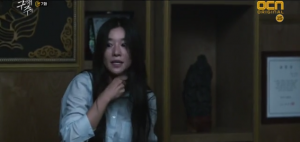
Clearly getting the message, Sang-hwan and company investigate the cult holding her captive and concoct a plan to rescue her. Meanwhile, Dong-cheol lives his post-jail life as a casino worker by night and delivery boy by day — intentionally avoiding Sang-hwan because of their history. Eventually, Sang-hwan and Dong-cheol link up and decide to join forces to save Sang-mi. However, after discovering the cult’s stronghold on the police force, Sang-mi resignedly returns back to Guseonwon to become the “spiritual mother” (the spiritual father’s bride). Refusing to give up on her, Sang-hwan asks his father for help with Sang-mi. Dong-cheol also infiltrates the cult to find out where she is.
One thing that was definitely present in the previous episodes, but became especially prevalent in episodes 5-10, is a certain motif: the phrase “save me”. There are various characters in the story who vie to be saved: the man with stomach cancer who begs the spiritual father for help, Sang-mi’s father crippling reliance on the spiritual father for shelter from satanic forces, and Sang-mi herself. These characters all inject the phrase with their own meanings. Sang-mi means the phrase in a very literal sense; she is held against her will in a cult and is being forced to marry a man much older than her. Of course, she wants a way out at all costs.
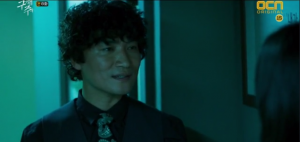
However, Sang-mi’s father and the man with stomach cancer evidently mean the phrase in a completely different way. They both see the cult as their saving grace, liberating them from the troubles they face in their day-to-day lives. As these people are granted their much-desired break within Guseonwon, a question is raised: is the cult really doing a bad thing by satisfying their lust for escapism? As mentioned in my previous review, Save Me makes it clear that Guseonwon is exploitative and corrupt. However, in regards to those who willingly join out of a desire to escape their dreadful lives, it is shown that the cult provides a benefit to them by granting them hope that would otherwise be out of their grasp. Are these people really wrong for wanting this? Is it imperative that they must always accept the truth, no matter how ugly it is?
This leads into another idea that Save Me highlights: the desire for escapism. It’s a force to be reckoned with, especially when coupled with a mob mentality. The spiritual father muses that people seek salvation in his cult because they are afraid of death for both themselves and their loved ones. We can see the truth of the statement through Jeon-gu’s grandmother as she grapples with his death and adamantly insists that Jeon-gu was killed in an accident and is resting in paradise. She goes almost hysterical at Sang-mi’s suggestion that she tries to uncover the insidious truth behind her grandson’s death.
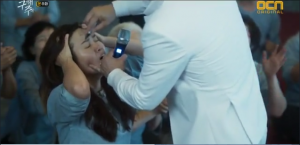
The grandmother’s episode segues into a sermon where the attendees’ thirst for salvation/escapism reaches a feverish high. The attendees of the sermons were always shown to be zealous, but the atmosphere in two particular sermons displayed in episodes 5-10 reveal a much more fervent, borderline delirious atmosphere. The attendees babble incoherently and shake their hands in a flurry of fanaticism. Even as Sang-mi tries to talk reason into them, the spiritual father easily maneuvers them into a frenzied witch hunt of an “evil spirit” living within Sang-mi and her mother.
Moving on, the themes of bystanderism and social statuses continuously hover in the foreground of the drama, albeit on a wider scale. Sang-hwan’s father and friend encourage him not to get involved in Sang-mi’s business and to forget about it. Being fueled by 2014’s events, however, Sang-hwan refuses to turn his attention away from her. The focus is simply honed in now on society at large rather than a small high school microcosm.
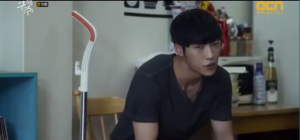
Another idea that’s translated out of a high school setting and into the adult world is the discrepancy between Sang-hwan and Dong-cheol’s social statuses, and how it drives a wedge into their relationship. Dong-cheol’s co-worker at the casino points out that their differences in wealth ensure that Sang-hwan and Dong-cheol will always have difficulties in their relationship. This interestingly adds a fate versus free will dimension to their relationship that will hopefully be explored in more depth later on.
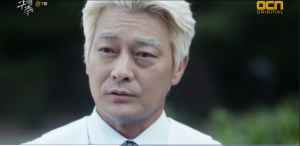
One last notable thing about episodes 5-10 is how they constantly juxtapose the different familial relationships the characters have. Jung-hoon’s (David Lee) father genuinely cares for him, but he is misguided in the matter concerning Sang-mi and the cult. By contrast, Sang-hwan’s father appears to have his own firm agenda, in which he has no space for anyone else’s needs, including that of his own son. In addition, Sang-mi’s father obviously has good intentions but is ignorant of the deranged mess he has transformed into. These different storylines present a sliding scale of parent/child relationships of sorts; something that can lend itself to some compelling themes.
Speaking of Sang-hwan’s father, he unexpectedly emerges as an interesting villain. He is involved in an affair with his assistant for a completely predictable reason, to make him feel like a man where his wife failed. He displays some sociopathic tendencies. He shows an aberrant fascination with life, coldly killing an animal grasping onto the last remains of its life because he didn’t consider a half life equivalent to a full life. He also reveals in a conversation with the detective that his primary reason for fishing is to see that fish struggle for life even with a hook in their gill. For now, he still puts on the pretense of being a caring father and husband, but I would like to see how he copes with getting his reputation ruined.
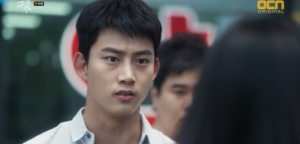
The spiritual father’s character development fell a bit flat. At this point, I was expecting a subtle and nuanced reveal of his motives for starting the cult, but nothing is revealed. We see him lose his cool and break items in his office when Sang-mi runs away successfully. We also see him accepting money from the man with stomach cancer and briefly losing his temper when Sang-mi gives a lecture during his sermon to the crowd of rowdy believers. The fact that he accepted money from the man with stomach cancer is contradictory to what he does in the beginning of the series when he denies money from a donor.
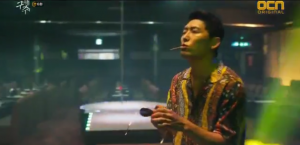
This, coupled with the fact that his motives are still a big question mark, outlines the brief scenes where he loses his calm as out of character moments rather than actual development. Perhaps the brunt of my disappointment with him lies in the type of character I was expecting out of him. I eagerly anticipated a morally gray anti-villain, one that could dish out compelling fragments of his own personal philosophy comprising of the power to make the audience question their stance on his cult. To no avail, I waited for him to combat Sang-mi’s constant declarations of the cult’s vileness with his own intelligent arguments.
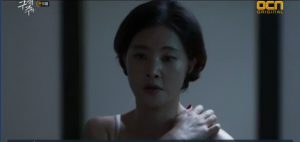
Apostle Kang is probably the character we find out the most about. When her past is shown, it becomes clear that she genuinely lives and dies by the cult’s teachings. A desire to find sanctuary from an abusive husband seems to drive her and her daughter Yu-ra to join the cult. Apostle Kang has a constant reminder of him on her body in the form of a scar from a pot of boiling water he threw on her. Not wanting Sang-mi to suffer the same (presently unclear but seemingly precarious) fate as Yu-ra — who also constantly denounced the cult’s teachings — she wants to make sure that Sang-mi becomes spiritual mother.
Thematically, Save Me continues to deliver insightful and biting commentary on society at large. Plot-wise, it continues to deliver absorbing schemes and narratives. Although there is a crinkle in the fabric of its character development, the drama can hopefully smoothen it out in the later episodes.
(Images via OCN)


